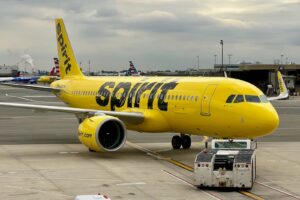The leading lobbying group for the U.S. travel industry this week claimed inefficient policies like long tourist visa wait times and friction points like lagging security screening technology are causing the United States to lose its competitive edge when it comes to attracting international visitors — not high prices on airfare and hotel rates.
A study out this week from the U.S. Travel Association and Euromonitor International claims the U.S. is at risk of losing 39 million visitors with a combined $150 billion in spending power over the next decade due to “excessive” visitor visa wait times. The study also ranked the U.S. 17th out of 18 top travel destinations like the U.K. (ranked first), France (ranked second) and Turkey (ranked third) in terms of overall global tourism competitiveness. China was the only country to rank lower than the U.S. in the top 18.
“The competition is outperforming us,” said U.S. Travel Association president and CEO Geoff Freeman in a press conference Thursday. “The economic cost of these failures is in the billions of dollars.”
Why the lagging competitiveness?
The U.S. Travel Association commissioned the report to better understand the slow return of international travel to the U.S. following the end of pandemic-related restrictions. According to the study, the U.S. in 2023 was estimated to only be at 84% of its international tourism levels.
While the U.S. remains the most-desired destination for global travelers, it ranks third (behind Spain and France, respectively) in terms of actual international visitor count. Spain, France, Turkey, Mexico, the U.K., Greece and the United Arab Emirates all had international visitor totals last year that exceeded prepandemic levels.
In what areas is the U.S. as a brand scoring low, per the report? Government leadership on travel-related issues, national travel strategy, safety and security, visa wait times and visa waivers. The U.S. only grants 42 countries visa-free travel privileges compared to the U.K., which designates 102 countries with visa-free travel designation. The U.S. also scores in the middle in terms of biometric security screening capabilities, which can make air travel more efficient when used to its maximum potential.
The study does not say either of the main U.S. political parties is a problem, but it notes that most major markets have a minister of tourism. The U.S. does have an assistant secretary of commerce for travel and tourism position, but that job has not been filled or funded by Congress.
The U.S. does get high marks for its destination marketing, air connectivity and Trusted Traveler Programs.
The costly elephant in the room
Curiously, the high cost of hotels and airfare in the U.S. wasn’t mentioned as a potential deterrent for driving international visitors away from the U.S.
While a press release from the U.S. Travel Association indicated the report was commissioned to study why international visitors were slow to return following the end of pandemic-related restrictions, Freeman noted the organization was looking at factors that were “decades in the making.”
“We’ve seen these issues rear their ugly head for many, many years and be a deterrent for travelers. We’ve had other points in time where our market share has slipped, although not in the sustaining way that it is right now,” Freeman said. “So when you look at the period of time of 2023, I’m sure costs played a role for some; although, as we look at inflation around the world, the U.S. is actually quite moderate compared to the inflationary pressures that people are feeling in countries all around the world.”
Freeman later said that the market will naturally take care of pricing issues for consumers. But it is the role of the government to smooth out some of these longer-term factors driving visitors away.
“We will continue to look at the roadblocks we put in place that can be addressed, and those are, by and large, the roadblocks that are created and perpetuated by government,” Freeman said.
Related reading:
- Key travel tips you need to know — whether you’re a beginner or expert traveler
- The best travel credit cards
- Where to go in 2024: The 16 best places to travel
- 6 real-life strategies you can use when your flight is canceled or delayed
- 8 of the best credit cards for general travel purchases
- 13 must-have items the TPG team can’t travel without



